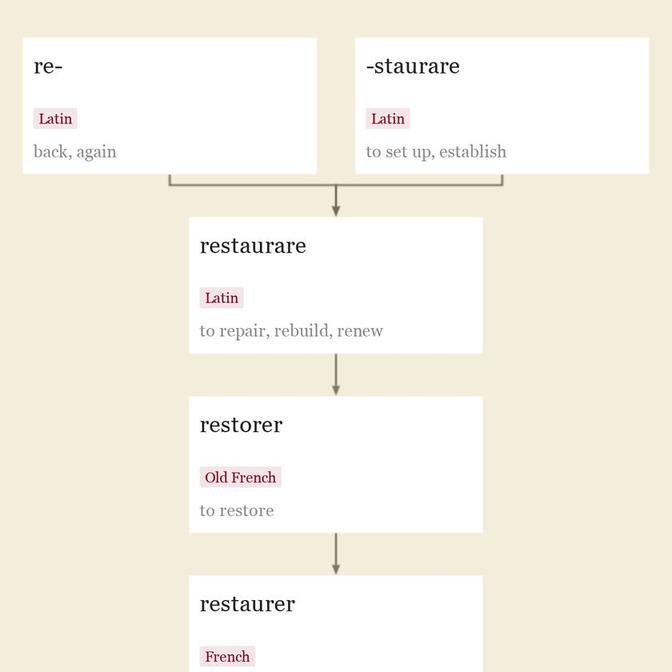instauration (n.)
"恢复,更新",大约1600年,源自拉丁语 instaurationem(主格 instauratio)"一次更新",动作名词,来自过去分词词干 instaurare "建立,确立; 更新,恢复",来自 in- "在"(源自 PIE 词根 *en "在")+ -staurare(也在 restaurant 中找到的词尾),源自 PIE *stauro-,来自词根 *sta- "站立,使坚定"。
instauration 的相关词汇
原始印欧语根词,意为“在”。
它构成或部分构成以下单词: and; atoll; dysentery; embargo; embarrass; embryo; empire; employ; en-(1)“在; 进入; ” en-(2)“靠近,在,上,在...之内; ” enclave; endo-; enema; engine; enoptomancy; enter; enteric; enteritis; entero-; entice; ento-; entrails; envoy; envy; episode; esoteric; imbroglio; immolate; immure; impede; impend; impetus; important; impostor; impresario; impromptu; in; in-(2)“进入,在,上,在...之内; ” inchoate; incite; increase; inculcate; incumbent; industry; indigence; inflict; ingenuous; ingest; inly; inmost; inn; innate; inner; innuendo; inoculate; insignia; instant; intaglio; inter-; interim; interior; intern; internal; intestine; intimate(形容词)“亲密的,非常熟悉的; ” intra-; intricate; intrinsic; intro-; introduce; introduction; introit; introspect; invert; mesentery。
它是假设的源头,其存在的证据由以下单词提供:梵语 antara- “内部; ”希腊语 en “在,上,在...之内; ” eis “进入; ” endon “在...之内; ”拉丁语 in “在,进入; ” intro “向内; ” intra “内部,内部的; ”古爱尔兰语 in,威尔士语 yn,古斯拉夫语 on-,古英语 in “在,进入; ” inne “在...之内,内部的。”

"餐馆,可以购买和进食饭菜的场所",1821年,源自法语 restaurant "一家餐馆",最初意为"恢复体力的食物",是 restaurer "恢复或提神"的现在分词名词用法,源自古法语 restorer(参见 restore)。
In 1765 a man by the name of Boulanger, also known as "Champ d'Oiseaux" or "Chantoiseau," opened a shop near the Louvre (on either the rue des Poulies or the rue Bailleul, depending on which authority one chooses to believe). There he sold what he called restaurants or bouillons restaurants—that is, meat-based consommés intended to "restore" a person's strength. Ever since the Middle Ages the word restaurant had been used to describe any of a variety of rich bouillons made with chicken, beef, roots of one sort or another, onions, herbs, and, according to some recipes, spices, crystallized sugar, toasted bread, barley, butter, and even exotic ingredients such as dried rose petals, Damascus grapes, and amber. In order to entice customers into his shop, Boulanger had inscribed on his window a line from the Gospels: "Venite ad me omnes qui stomacho laboratis et ego vos restaurabo." He was not content simply to serve bouillon, however. He also served leg of lamb in white sauce, thereby infringing the monopoly of the caterers' guild. The guild filed suit, which to everyone's astonishment ended in a judgment in favor of Boulanger. [Jean-Robert Pitte, "The Rise of the Restaurant," in "Food: A Culinary History from Antiquity to the Present," English editor Albert Sonnenfeld, transl. Clarissa Botsford, 1999, Columbia University Press]
1765年,一位名叫布朗热(也被称为"鸟场"或"鸟歌")的人在卢浮宫附近开了一家商店(根据不同的权威,可能位于普利街或拜约街)。他在那里出售他所称之为 restaurants 或 bouillons restaurants 的肉汤,旨在"恢复"人的体力。自中世纪以来, restaurant 一词一直用来描述各种由鸡肉、牛肉、各种根茎、洋葱、草药以及根据一些食谱的说法,还有香料、结晶糖、烤面包、大麦、黄油,甚至干玫瑰花瓣、大马士革葡萄和琥珀等珍奇成分制成的浓汤。为了吸引顾客进入他的店铺,布朗热在窗户上刻了一行福音书的话: "Venite ad me omnes qui stomacho laboratis et ego vos restaurabo."。然而,他并不满足于只提供肉汤。他还供应白酱羊腿,从而侵犯了餐饮工会的垄断权。工会提起诉讼,令所有人惊讶的是,最终判决支持布朗热。[让-罗伯特·皮特(Jean-Robert Pitte),《餐馆的崛起》,收录于《食物:从古代到现代的烹饪史》,英文编辑阿尔伯特·索嫩费尔德(Albert Sonnenfeld),翻译克拉丽莎·博茨福德(Clarissa Botsford),1999年,哥伦比亚大学出版社]
意大利拼写 ristorante 于1925年在英语中得到证实。中古英语中的法律语言中也有类似的词,如 restaurance "赔偿"。铁路 restaurant car(1872年)是一种为旅客提供餐食的改进方式。
*stā-,印欧语系根词,意为“站立,放下,使坚定或保持稳定”,其中带有“立着的地方或物”的派生词。
它构成了以下词汇全称或部分: Afghanistan; Anastasia; apostasy; apostate; armistice; arrest; assist; astatic; astatine; Baluchistan; bedstead; circumstance; consist; constable; constant; constitute; contrast; cost; desist; destination; destine; destitute; diastase; distance; distant; ecstasy; epistasis; epistemology; establish; estaminet; estate; etagere; existence; extant; Hindustan; histidine; histo-; histogram; histology; histone; hypostasis; insist; instant; instauration; institute; interstice; isostasy; isostatic; Kazakhstan; metastasis; obstacle; obstetric; obstinate; oust; Pakistan; peristyle; persist; post(n.1)“竖立的木材”; press(v.2)“强制使用”; presto; prostate; prostitute; resist; rest(v.2)“剩下,停留”; restitution; restive; restore; shtetl; solstice; stable(adj.)“防止倒塌”; stable(n.)“家畜笼舍”; stage; stalag; stalwart; stamen; -stan; stance; stanchion; stand; standard; stanza; stapes; starboard; stare decisis; stasis; -stat; stat; state(n.1)“情况,条件”; stater; static; station; statistics; stator; statue; stature; status; statute; staunch; (adj.)“强壮的,结实的”; stay(v.1)“停下,留在原地”; stay(n.2)“支撑船桅的强绳”; stead; steed; steer(n.)“肉牛”; steer(v.)“引导车辆的路线”; stem(n.)“植物的主干”; stern(n.)“船的尾部”; stet; stoa; stoic; stool; store; stound; stow; stud(n.1)“钉头,按钮”; stud(n.2)“用于繁殖的马”; stylite; subsist; substance; substitute; substitution; superstition; system; Taurus; understand。
它是以下词汇的假定来源/其存在的证据由以下事实提供:梵文 tisthati “静止”; 阿维斯塔语 histaiti “站立”; 波斯語 -stan “国家”,意为“一个人站的地方”; 希腊语 histēmi “放置,安放,使站着; 称重”, stasis “静止”, statos “放置”, stylos “支柱”; 拉丁语 sistere “静止,停止,使静止,放置,出庭”, status “方式,位置,状态,态度”, stare “立着”, statio “位置,岗位”,立陶宛语 stojuos “I 放置自己”, statau “I 放置”; Old Church Slavonic staja “放置自己”, stanu “位置”; 哥特语 standan,古英语 standan “站着”, stede “放置”; 古挪威语 steði “铁砧”; 古爱尔兰语 sessam “站立的行为”。